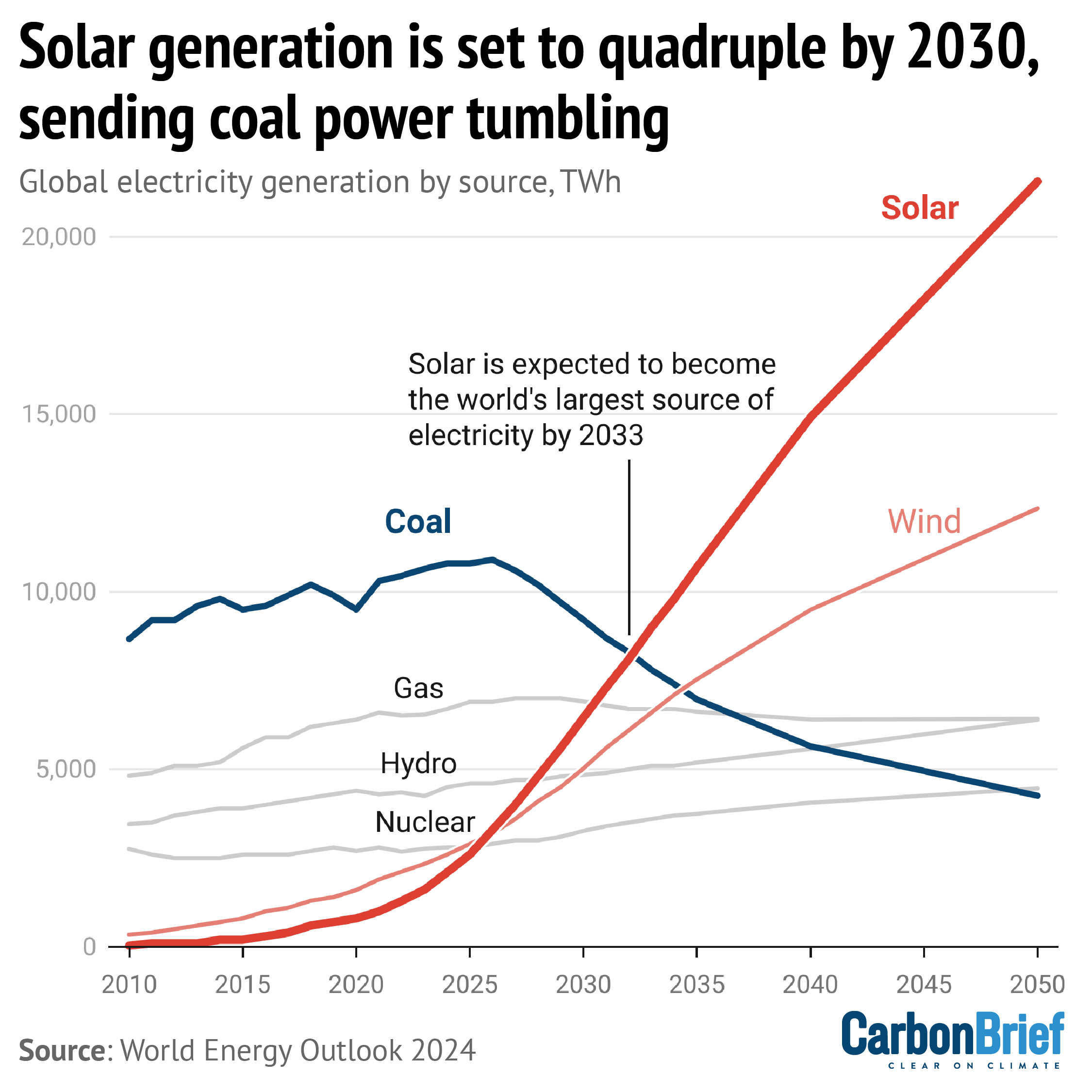
DeBriefed 18 October 2024: IEA projects solar surge; US counts cost of hurricanes; Is global warming ‘accelerating’?
Ayesha Tandon
10.18.24Ayesha Tandon
18.10.2024 | 4:10pmWelcome to Carbon Brief’s DeBriefed.
An essential guide to the week’s key developments relating to climate change.
This week
Energy outlook
DEMAND SURGING: The International Energy Agency (IEA) published its annual World Energy Outlook report – a “comprehensive” summary of global energy trends – the New York Times reported. The outlet said, over the next decade, the world will add the equivalent of Japan’s annual electricity demand each year, driven by demand for new factories, electric vehicles, air-conditioners and data centres. (Axios said the IEA included a “reality check” about data centre demand, which would only make up a “small share” of growth by 2030.)
AGE OF ELECTRICITY: Reuters reported that the “world is on the brink of a new age of electricity”, with global fossil fuel demand set to peak by the end of the decade. The newswire added that “surplus oil and gas supplies could drive investment into green energy”. The Wall Street Journal said clean energy would grow faster than global energy demand, becoming the largest source of power in the mid-2030s, according to the IEA. Carbon Brief has just published an in-depth analysis of the report’s findings. (See Captured below.)
COP16 kickoff
BIODIVERSITY TALKS: The COP16 biodiversity summit begins in Cali, Colombia, on Monday. It will be the first set of UN biodiversity negotiations since the world’s nations agreed a landmark deal in 2022 to “halt and reverse” nature loss by the end of the decade.
MISSED PLEDGES: Joint analysis published on Tuesday by Carbon Brief and the Guardian showed that more than 85% of countries are set to miss the UN’s deadline to submit new nature pledges, known as national biodiversity strategies and action plans (NBSAPs).
WHAT TO WATCH: Carbon Brief’s team of journalists on the ground in Cali will host a webinar on Tuesday at 3pm UK time to discuss the key issues facing negotiators and answering questions. (Sign up for free.) Through the fortnight of the talks, they will also be scrutinising each new draft negotiating text as it lands, explaining areas of disagreement and updating Carbon Brief’s interactive text tracker.
After the storm
DEVASTATING DAMAGES: Hurricanes Helene and Milton are “likely” to each rack up costs of more than $50bn, the Associated Press reported. According to the newswire, “government and private experts” say the hurricanes could join the “infamous ranks” of Katrina, Sandy and Harvey – which are among the eight US storms to have ever caused damages of more than $50bn.
PAYOUTS: The US Small Business Administration has exhausted funds for its disaster loan program following increased demand from Hurricane Helene, Reuters warned. Officials said the program needs about $1.6bn amid heightened demand following Hurricane Helene, according to the Hill. The Financial Times estimated that Milton alone will lead to about $36bn of insurance payouts for the private sector.
Around the world
- DIRTY ENERGY: Burning household rubbish to make electricity is now the “dirtiest way the UK generates power”, BBC News reported.
- COP BID: Australia has launched a bid to host the COP31 climate summit in 2026 in Adelaide, according to the Guardian.
- FINANCE FAIL: The EU unveiled its negotiating stance for the COP29 climate talks next month, but did not address how it will boost funding for developing countries, according to Bloomberg.
- CURBING COAL: The US Supreme Court allowed the Environmental Protection Agency to move ahead with its plans to limit carbon emissions by power plants, despite a pending challenge from 27 mainly-Republican states, the New York Times reported.
- WARNING MESSAGE: Activist group Friends of the Earth warned the UK government to drop its support for a Mozambique gas project “embroiled in allegations of abduction, murder and rape”, said Politico.
- WIND POWER: A Chinese company developed the world’s “most powerful” floating offshore wind turbine with a capacity of 20 megawatts, state news agency Xinhua said.
60%
Global increase in forest fire carbon emissions over 2001-23, according to a new paper in Science.
Latest climate research
- Recent floods that killed at least 244 people in Nepal were driven by rainfall made “about 10% more intense” by human-caused climate change, according to a rapid attribution study.
- Drought and aridity are already having a “significant impact” on internal migration – especially in arid and “hyper-arid” regions of southern Europe, South Asia, Africa and the Middle East and South America – new research found.
- Many people in the US are experiencing “psychological distress” from climate change, but those who do are more involved in collective climate action, a new study said.
(For more, see Carbon Brief’s in-depth daily summaries of the top climate news stories on Monday, Tuesday, Wednesday, Thursday and Friday.)
Captured

Electricity generation from solar is set to quadruple by 2030, sending coal power tumbling and becoming the world’s largest source of electricity by 2033, according to Carbon Brief analysis of the International Energy Agency’s World Energy Outlook. The report finds that global CO2 emissions are set to peak “imminently”, as the “age of electricity” sends fossil fuels into decline. See Carbon Brief’s in-depth coverage of the report.
Spotlight
Is global warming ‘accelerating’?
A recent “surge” in global warming is not statistically “detectable”, according to a study published this week. But does this mean it is not happening? Carbon Brief speaks to the lead author of the study and explores the debate on a warming acceleration.
Global temperatures are soaring. Last year was the hottest year on record, with global surface temperatures reaching 1.34-1.54C above pre-industrial levels. But 2024 is already setting blistering new records and is expected to knock 2023 off the top spot.
Against this backdrop of ever-worsening heat, a new study in Communications Earth and Environment used statistical methods to see whether an acceleration in global warming could be formally detected.
The authors find a “changepoint” in the rate of warming around the year 1970, but find no “statistically detectable” acceleration since then.
Dr Claudie Beaulieu is the paper’s lead author and an associate professor in the Ocean Sciences Department at UC Santa Cruz. She told Carbon Brief: “If an acceleration in global warming is occurring, the size of that acceleration is either too small or too recent to robustly detect it in globally-averaged surface temperature records.”
However, some scientists questioned the methods used in the study. Prof Richard Allan, a professor of climate science at the University of Reading, said the surface warming data used in this study is “influenced by natural variation”. He argued that “when all lines of evidence are scrutinised” – such as satellite data and ocean measurements – “it is apparent that climate change is accelerating rather than continuing steadily”.
Carbon Brief’s climate science contributor, Dr Zeke Hausfather, published a factcheck earlier this year on the acceleration in global warming. Assessing observations and climate model output, he concluded that “that there is increasing evidence of an acceleration in the rate of warming over the past 15 years”.
Beaulieu told Carbon Brief that present-day discussion about an acceleration in warming is similar to the debate over a warming “hiatus” about a decade ago. She continued:
“Back then, also using statistical methods, we showed that a ‘hiatus’ in warming was not detectable. With hindsight of more years of observations it is now obvious warming had just continued leading to the record heat of 2023. We need to keep monitoring.”
Dr John Kennedy is the co-chair of the World Meteorological Organisation (WMO) expert team on climate monitoring and assessment and scientific coordinator for the annual WMO State of the Global Climate reports.
He warned that this statistical method can mean waiting many years for warming – or a lack of warming – to be detectable. In a blog post earlier this year, Kennedy wrote:
“One thing that became clear during the ‘hiatus’ is that this kind of analysis is the kind of thing you do when you’re set (for whatever reason) on being the last person to know there is a hiatus.”
He added: “There are good physical reasons to expect an increase in the underlying warming.”
Beaulieu does not refute that warming might be accelerating. She said that “the point of the paper is that it will take additional years of observations to detect a sustained acceleration”.
Watch, read, listen
CLIMATE LINGO: Author and climate change activist Genevieve Guenther joined the Drilled podcast to discuss her new book, The Language of Climate Politics, which digs into rhetorical devices that she says are being used to slow or block climate action.
FAILING SINKS: “Is nature’s carbon sink failing?” asked a feature in the Guardian. The article warned that forest, plants and soil absorbed almost no carbon in 2023, and asked whether this “could rapidly accelerate global heating”.
FARM SUBMERGED: A short video by BBC News follows Nigerian farmers discussing the impacts of climate change on their livelihoods and highlights possible solutions.
Coming up
- 21 October-1 November: United Nations Biodiversity Conference, COP16, Cali, Colombia.
- 23 October: Ministerial Meeting of the Coalition of Finance Ministers for Climate Action, Washington DC, US.
- 25 October: Kiribati Presidential elections, Kiribati.
Pick of the jobs
- University of Bath, Centre for Climate Change and Social Transformations, research associate | Salary: £37,999-45,163. Location: Bath, UK
- Intergovernmental Panel on Climate Change (IPCC), science coordinator in the Working Group I Technical Support Unit | Salary: unknown. Location: Gif-sur-Yvette, France.
- Cornell University, Oceanography of a Changing Planet – assistant/early associate professor | Salary: $90,000-130,000. Location: New York.
DeBriefed is edited by Daisy Dunne. Please send any tips or feedback to [email protected].
This is an online version of Carbon Brief’s weekly DeBriefed email newsletter. Subscribe for free here.

